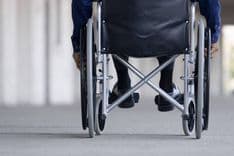Many people are unaware of what a reasoned offer for a road traffic accident is until they are forced to initiate a claim for compensation. The term is relatively new, it was first included in the 2016 schedule of awards and was conceived as a way to try to settle out of court disputes between parties involved in a road traffic accident.
If you are one of those who have never heard of it, we have prepared this guide so that you know what a reasoned offer consists of, what requirements it must meet and what options the victim of an accident has after receiving one.
What is a reasoned offer?
A reasoned offer is a formal document drawn up by the insurance company after receiving a claim for compensation for a traffic accident. In this document, the company acknowledges the facts and the responsibility of its insured, and at its discretion, makes an economic proposal to the victim as compensation for the injuries and damages suffered in the accident.
This offer, as its name indicates, must be motivated. That is to say, the insurance company must explain why it offers such an amount and justify it by means of medical reports and data. If this is not the case, the offer will not be considered valid.
After receipt, of course, the injured party will have to evaluate the offer.
Requirements according to Article 7 LRCSCVM
According to article 7 of the Law on Civil Liability and Insurance in the Circulation of Motor Vehicles, a reasoned offer must meet a number of requirements:
- Present an economic proposal to the victim for the damages suffered as a result of the accident, which is in accordance with the criteria set out in the accident scale of Law 35/2015, of 22nd September.
- In the event that there is concurrence of fault, the offer must indicate the percentage of the compensation that the insurer assumes.
- Detail and break down which documents, reports or data are available to be able to assess the injuries and damages of the claimant. In addition, you should indicate on which ones you have based the calculation of the economic proposal presented.
- Include the latest version of the medical report that describes the extent of the injuries sustained in the accident, how many days it took to heal, whether there are any after-effects, etc.
- If both personal injury and property damage have occurred, the offer should assess them separately and present the amount of compensation for one case and for the other.
- It should state that acceptance of the offer by the injured party does not mean that he waives the right to take legal action in the future.
- Indicate the form of payment of the compensation, which may be in cash or any other means that guarantees the immediate availability of the amount.
Medical report
Medical reports are essential for the victim of a traffic accident to receive fair compensation, as they serve as a basis for calculating the amounts that correspond to each of the items of which compensation is made up.
For this reason, it is obligatory for the insurance company to accompany the reasoned offer with a medical report that justifies the quantification of the temporary injuries, the after-effects and the pecuniary damage that has been caused. However, the medical report is not always attached, since if the claim coincides with the amount offered, it is understood that the medical documentation provided by the injured party is sufficient.
Deadline insurance company
As soon as a claim for compensation is filed with an insurer, the insurer has a period of three months from that date to submit a reasoned offer to the claimant.
Even if the victim of the traffic accident does not file a claim, from the moment the insurance company becomes aware of the existence of a claim, the law obliges it to assume the compensation that may correspond. Therefore, it must monitor the facts until the injured party is medically discharged.
The injured party has one year to be able to claim compensation, counting from the stabilisation of the injuries or medical discharge.
Reasoned offer out of time
If the insurer does not submit a reasoned offer within three months after receipt of the claim and there are no reasons for the delay, then the insurer is in "default". This means that in addition to the compensation of the damages due to the victim of the traffic accident, interest for late payment will have to be added to this amount.
Difference between a reasoned offer and a reasoned reply
When an insurer receives a claim for compensation for a traffic accident, the claimant may receive two types of reply: a reasoned offer or a reasoned reply.
The main difference is that the reasoned offer contains a proposal for compensation to settle the dispute between the parties involved in a claim and the reasoned reply is a statement of reasons why a reasoned offer cannot be made, either temporarily or permanently.
Like the reasoned offer, the reasoned reply also has to meet a number of requirements:
- If the reason is that the insurance company needs more time because it is complex to determine the amount of compensation or because the injured person is still undergoing rehabilitation, then the reasoned reply must include a commitment to submit a reasoned offer as soon as possible. In addition, the insurer is obliged to report every two months on the status of the file.
- If the reason is that it denies the responsibility of its insured for the claim or anything else in order not to pay compensation, the company's reasoned reply will make it clear that it refuses to meet the claim for compensation definitively.
Sometimes, in cases where the healing period of the injured party is undetermined, given the seriousness of his injuries, insurers use the reasoned reply to make a partial offer of compensation to the victim. In this way they avoid interest for late payment on those sums already advanced.
Am I obliged to accept the reasoned offer made by the insurance company?
A victim of a traffic accident is under no circumstances obliged to accept the reasoned offer made by the insurance company.
Once the claimant of the compensation receives the reasoned offer, he/she must thoroughly review whether the financial compensation is in accordance with the traffic accident scale, according to the injuries and after-effects suffered. It is advisable that this review is done with the help of a lawyer specialised in the matter.
If the interested party finally decides not to accept the offer proposed by the insurer, then there are two possible ways to continue with the claim for compensation, which are the following:
Appraisal report to the Institute of Legal Medicine
There is the possibility of requesting a valuation report from the Institute of Legal Medicine and Forensic Sciences.
In this report, the forensic doctor will determine whether there is a link between the victim's injuries and what happened in the accident. To do so, he/she will take into account the injuries sustained, the diagnostic tests carried out and the time required for recovery or rehabilitation. It will also indicate whether there are any functional, psychological or aesthetic after-effects and will make an assessment of these in order to establish the compensation that the injured party should receive.
It is important for you to know that this report:
- This can be requested by the injured party or by the insurer in agreement with the injured party. If it is the company that wants to make the request, it must have the claimant's authorisation and have previously submitted a reasoned offer.
- There is no cost for the victim.
- The doctor who will carry out the report is impartial and independent of both the company and the injured party.
The request for a forensic report obliges the insurer to submit a second reasoned offer within one month of the report being issued.
Legal action against the insurance company of the vehicle responsible for the accident
Once the deadline for submitting a reasoned offer has expired or if after having received it, there is no agreement on the part of the injured party, he can directly file a lawsuit against the insurance company of the vehicle responsible and/or against its driver.
In order to initiate legal action, it is essential to have the following documentation:
- The claim filed with the insurer.
- The reasoned offer received, if applicable.
- A medical report from a private expert who can attend the trial to ratify if necessary.
As opposed to the option of requesting a forensic report from the Institute of Legal Medicine, the judicial route will involve a financial cost for the claimant, as he/she will have to pay the fees of the expert who carries out the report and of the solicitor, if the amount claimed exceeds €2,000. In addition, there is a risk of being ordered to pay costs and having to pay the other party's legal costs as well. Therefore, if you want to be sure that you make the best decision, always rely on the advice of expert traffic accident compensation lawyers, such as those at Trafilex.












